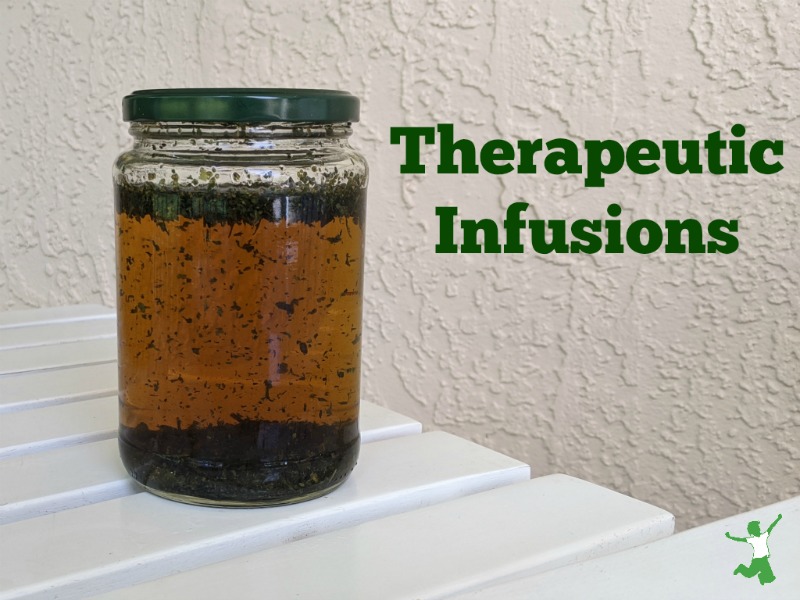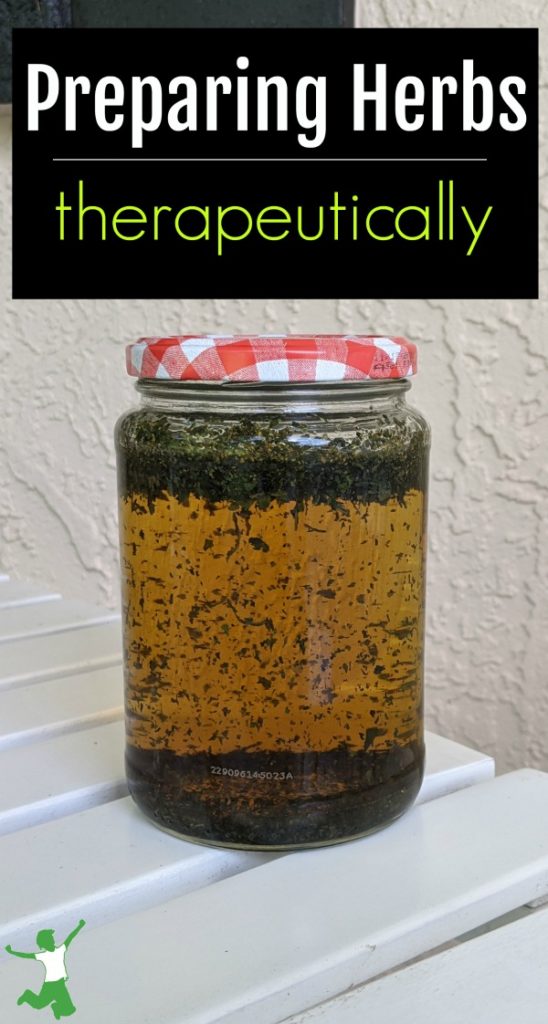Table of Contents[Hide][Show]
How to most effectively steep herbs into a potent and therapeutic infusion whether using tea, roots, bark, leaves, seeds, or flowers to experience the maximum health benefits with no side effects.
An infusion of fresh or dried herbs is typically used interchangeably with a simple cup of herbal tea.
The two are actually quite different both in taste and therapeutic benefits. A properly prepared infusion is more potent and easily absorbed than plain herbal tea. However, it is not as potent as a homemade herbal tincture.
If you plan to use herbs therapeutically as in the use of nettle tea during pregnancy to tone the uterus and prepare for natural childbirth, it is best to prepare herbal infusions instead of tea.
In fact, using tea bags can be a source of toxin exposure due to the manufacturing process. It is safest to use organic, loose tea or whole herbs to prepare traditional infusions if possible.
Herbal Infusion Benefits
The ease of assimilation and increased potency of herbal infusions is due to careful preparation. The process involves boiling water and steeping of the herbs for anywhere from 30 minutes to 8 hours depending on the type of plant matter used.
The boiling of the water releases any dissolved gases from the water into the air which are not reabsorbed by the water due to the tight-fitting lid on the steeping jar.
These dissolved gases can interfere with the rapid and complete assimilation of the nutrients released into the water by the herbs as they steep in the cooling water.
This boiling of water to release any dissolved gases and then cooling of the water in a glass jar with a tight lid to restrict the gases from redissolving back into the water is referred to as the “wonder water” effect. (1)
Using the wonder water principle, how should herbal infusions be properly prepared?
Very easily as it turns out.
Preparing Infusions
Note that the preparation of infusions varies slightly based on the part of the plant you intend to use. Below are guidelines on how much to use and how long to steep.
Roots and Bark
If making an herbal infusion using the roots or bark of a plant, use one ounce of plant matter per pint of water to be used.
Place the correct amount of plant matter at the bottom of a glass mason jar and fill to the top with boiling water. Screw the lid on tightly and leave at room temperature for 8 hours.
Leaves
Use one ounce of dried leaves per quart of water. Place the leaves in a quart mason jar and fill to the top with boiling water. Tightly screw on the lid and leave at room temperature for 4 hours.
Flowers and Seeds
One ounce of flowers per quart of water should be steeped in boiling water as it cools in a mason jar with a snugly fitting lid for no more than 2 hours.
Steep one ounce of seeds per pint of boiling water. Affix a tight-fitting lid on a mason jar and let sit for only 30 minutes.
Dosage and Storage
Before making your infusion, be sure your dried herbs are of proper potency. This article on storing bulk herbs and loose teas outlines how to preserve your precious plant matter!
Once the herbs have steeped for the proper amount of time, strain out the plant matter and drink 2 cups per day if you weigh between 125 – 150 lbs until the infusion is used up. (2)
Add an additional one-half cup per day for every 30-40 lbs additional weight. Similarly, if you weigh less than 125 lbs, reduce dosage by one-quarter cup for every 15-20 lbs.
Herbal infusions spoil rapidly so it is best to make and use them up as soon as possible.
Store unused portions in the refrigerator for no more than a day and then prepare a fresh batch. You also have the option of freezing them for later use. This article on freezing in plastic versus glass provides information on how to safely use either type of container.
Which Herbs to Try
Do you make and use herbal infusions on a regular basis? If so, which herbs do you use and for what purposes? Here are some ideas to get you started:
- How to use herbs for fertility
- Herbs for seasonal allergies
- Best herbal antibiotics
- Natural herbal birth control
- Best herbs for sounder sleep

(1) Wise Woman Herbal
(2) Natural Health and Herbal Medicine








Is Nettle tea safe to use throughout pregnancy? I’m only three months pregnant — could I start drinking it now? Thanks!
The Herbal Infusion “Wonder Water” Effect – The Healthy Home Economist
http://ow.ly/6Gscw
Hi Sarah,
I just found your blog and really like it. I posted a couple of your posts at my blog and linked it to yours. Is that OK? if not let me know. Thanks.
etr
My blog is “eggs and butter are good for you” at: http://www.momsforkids.blogspot.com/
Hi etr,
Glad you are finding some of the posts here helpful .. of course – feel free to share them and linking back is most courteous. Thank you.
I started drinking herbal infusions daily two weeks ago. I drink nettle infusion and oatstraw. While I don’t really feel a physical difference, I love drinking them.
This is a great and well written post! We share how to make infusions etc in our free How to Use Herbs ebook for our newsletter signups and you are correct that it is a much more potent, basically medicinal, tea in the end. For herbal teas, you want as much of the properties of the herbs as possible. Another tip is that when you strain, use a tea towel or cloth napkin over your cup and then wrap up the herbs in the napkin and squeeze/twist to get even more of the herbal properties in your cup.
Nettle is one of my favorite herbs. It is so nutritionally dense and great for seasonal allergies as well. We add Nettle to nearly every blend for the nutritional content alone. Nettle by itself does not taste so great so mix it with peppermint or spearmint and you then have a palatable tea. 😉 Peppermint also acts as a catalyst for the assimilation of other herbs so it is always beneficial to add to herbal blends. And it is mighty tasty too! 🙂
Nickole
Thanks for this info, Nickole. You are so right that nettle is not that tasty trying it for the first time by itself. I’ve had so much of it over the years though that I’ve developed a taste for that very rich grassy flavor! 🙂
Hi Sarah, this is great information. Tomorrow is Wildcrafting Wednesday, would you mind sharing this post with my readers? I’m sure they would love it! 🙂
Thanks!
~ Kathy
I’ve heard that Nettle isn’t good for people with Hypoglycemia. I was wondering if you have more information on this?
All I can tell you is that I am a lifelong hypoglycemic (in remission for over a decade since going on a high saturated fat diet … never been healthier!) and nettle works beautifully with my physiology.
The mason jar won’t crack if you pour boiling water into it?
I shouldn’t, but I make my infusions in a french press. It’s made for hot water and after I’m done steeping, I can just press the herbs to the bottom and drink the infustion. 🙂
I’m sure if Mason jars can withstand a pressure cooker they will be fine with boiling water being pored in.
Ilana,
To prevent cracking the jar, put a stainless steel table knife in the jar. The metal will absorb the heat and reduce the chance of cracking.
I have had room temperature Mason jars crack from adding boiling water too quickly. I pre-warm them with hot water from the faucet. I then dump that water out right before I pour about one inch of my boiling water in the jar. After the jar feels very hot, which usually just takes a few minutes, I finally pour the rest of the boiling water in the jar. No broken jars this way!
be careful- not all herbs should be prepared as infusions! for example, chamomile, should not be steeped longer than 10minutes or so, longer than that may make you ill. nettles, alfalfa, oat tops/oatstraw, comfrey are good for infusions.
raspberry, too!
Hi Candace, I’ve never had a problem using chamomile in an infusion and I always steep my teas at least 15 minutes.
You used the example of nettle tea. Do you have any other suggestions for a different tea? I am not pregnant and I am done having kids but would like more ways to use this method for good health.
I still use nettle tea for female health even though I don’t plan for any more children – it’s not just for pregnancy and childbirth! 🙂
I agree Sara!
Nettle tea is also a great source of iron for those deficient in it! I used to drink it to get my iron stores up after the lab work said I am low in it.
Thanks for this post, it is so easy to steep herbs it turns out!
I didn’t know Nettle helps with iron. I have been anemic for years!! I will try this.